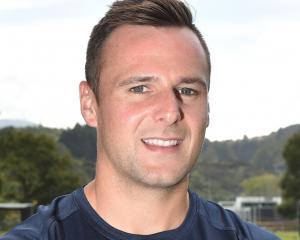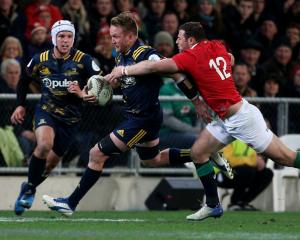
They say rugby is like war.
It is an on-field collision where only the strong survive.
The trouble for the Highlanders in the past few years is they that have been taking pea-shooters to the battlefield while the opposition has been wheeling out missiles and tanks.
The Highlanders' budget has been the size of a minor power - perhaps a country like France - while those further north have had the financial might of a United States or a China.
The New Zealand Rugby Union has always paid the wages of the five franchises, but it has never been a pot of money divided equally five ways.
Teams which have produced more All Blacks have been given more money to keep their stars, and from there have also kept the rest of the talent, national player or not.
That has led to some teams getting a lot more money into their pot than others.
One wonders how the likes of the All Black-laden Crusaders had any money left in the pot to attract Zac Guildford - one of the hottest young wingers in the country - to join the franchise last year.
The Highlanders, especially in 2008 and 2009, have had a much smaller budget as they do not have as many All Blacks.
Change is about to happen but, like most things in rugby, it is going to take time, and whether it actually works will not be known for a few years.
Although it has yet to be signed off, the plan is to allow franchises to directly contract players from next season, and all franchises will have the same amount of money to spend.
The five teams will be able to sign up players from a designated date, directly to the franchise, no matter where they live and for whom they play.
Highlanders chief executive Richard Reid said once the direct contracting became fully developed then the Highlanders should benefit.
"There will be a transition period where existing contracts will have to be honoured.
But when existing contracts go away there will be more of a level playing field," Reid said.
"There will be more or less equal playing budgets.
If you have more All Blacks, they cost you more money and then your player budget is higher."This is where the Highlanders may benefit if the new deal, part of the employment collective agreement working its way around provincial unions, gets ratified.
A team like the Hurricanes with 13 past or present All Blacks in their 2010 squad - compared with five in the Highlanders - will have to sign all their players under an agreed budget, the same as the Highlanders.
They will get help from the NZRU for their All Blacks, but will have to contribute some money from their playing budget towards keeping their stars.
By paying for their All Blacks, they may not have enough left in the pot to pay for other players.
And that is where the Highlanders may become more attractive.
They will have more money to dole out, as they have fewer All Blacks.
Reid said it would be like having a salary cap.
Teams would not be able to stockpile talent as they would not have the money to do so.
Someone like Andrew Hore could come to the Highlanders if the Hurricanes decided he was not needed.
But does that mean the Highlanders are going to be full of players from other provincial unions while Otago and Southland players are left sitting on the sidelines?"We would still like to draw from our home unions.
"I'd like to think two-thirds of the side would be locals.
Twenty out of 30 players is an aim."
This year's Highlanders have 20 players from Otago and Southland out of 28.
Next year's squads will be enlarged to 30 players.
Reid said negotiations with high-profile players such as Otago All Blacks Adam Thomson and Tom Donnelly would also include NZRU representation.
Thomson and Donnelly are still negotiating with Otago about their future in the South.
The draft day when teams are announced and who is going where will be much less of a drama as it will become obvious who is in what team as the franchises sign players earlier.
The loan-back deals in which players sign for teams but stay within their own provinces is in essence what franchise contracting is now.
Player agent Simon Porter said direct franchising would not make much difference to player incomes, but it would help players much more off the field.
"Players will know where they are going and will be able to play accordingly.
"Look at someone like Jason Shoemark, who may not know until the team is announced where he is going.
"With the way Super rugby is going to be longer, going from December to August guys will want to know where they are based," Porter said.
Porter said it would be interesting to see whether it balanced out the playing talent or players were prepared to stay in one place for less money.
The Highlanders might benefit from having more money but it was not always about finances for players to move.
"I think it will be interesting to see what happens.
"It is probably not going to be big changes for players but it may be a shake-up for administrators."












